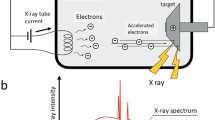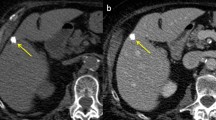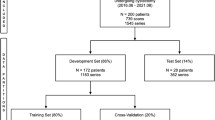Abstract
The aim of this study was to assess the effect of reconstructed slice thickness on the detection and characterization of human urinary calculi on a multidetector helical CT scanner. Nineteen human urinary calculi of various chemical composition measuring 1.0–3.7 mm were embedded into agar in a chamber of a nylon body phantom. The phantom was imaged with a four detector-row CT scanner. The number of detected calculi increased as the reconstructed slice thickness decreased. Measured diameters and density of the visible calculi decreased as the slice thickness increased. The results of the present study support the use of thin reconstructed slices to detect and characterize urinary calculi.





Similar content being viewed by others
References
Smith RC, Verga M, McCarthy S, Rosenfield AT (1996) Diagnosis of acute flank pain: value of unenhanced helical CT. Am J Roentgenol 166:97–101
Abramson S, Walders N, Applegate KE, Gilkeson RC, Robbin MR (2000) Impact in the emergency department of unenhanced CT on diagnostic confidence and therapeutic efficacy in patients with suspected renal colic: a prospective survey. Am J Roentgenol 175:1689–1695
Pfister SA, Deckart A, Laschke S, Dellas S, Otto U, Buitrago C, Roth J, Wiesner W, Bongartz G, Gasser TC (2003) Unenhanced helical computed tomography vs intravenous urography in patients with acute flank pain: accuracy and economic impact in a randomized prospective trial. Eur Radiol 13:2513–2520
Olcott EW, Sommer FG, Napel S (1997) Accuracy of detection and measurement of renal calculi: in vitro comparison of three-dimensional spiral CT, radiography, and nephrotomography. Radiology 204:19–25
Levine JA, Neitlich J, Verga M, Dalrymple N, Smith RC (1997) Ureteral calculi in patients with flank pain: correlation of plain radiography with unenhanced CT. Radiology 204:27–31
Van Beers BE, Dechambre S, Hulcelle P, Materne R, Jamart J (2001) Value of multislice helical CT scans and maximum-intensity-projection images to improve detection of ureteral stones at abdominal radiography. Am J Roentgenol 177:1117–1121
Sheafor DH, Hertzberg BS, Freed KS, Carroll BA, Keogan MT, Paulson EK, DeLong DM, Nelson RC (2000) Nonenhanced helical CT and US in the emergency evaluation of patients with renal colic: prospective comparison. Radiology 217:792–797
Miller OF, Rineer SK, Reichard SR, Buckley RG, Donovan MS, Graham IR, Goff WB, Kane CJ (1998) Prospective comparison of unenhanced spiral computed tomography and intravenous urography in the evaluation of acute flank pain. Urology 52:982–987
Takahashi N, Kawashima A, Ernst RD, Boridy IC, Goldman SM, Benson GS, Sandler CM (1998) Ureterolithiasis: can clinical outcome be predicted with unenhanced helical CT? Radiology 208:97–102
Coll DM, Varanelli MJ, Smith RC (2002) Relationship of spontaneous passage of ureteral calculi to stone size and location as revealed by unenhanced helical CT. Am J Roentgenol 178:101–103
Saw KC, McAteer JA, Monga AG, Chua GT, Lingeman JE, Williams JC Jr (2000) Helical CT of urinary calculi: effect of stone composition, stone size, and scan collimation. Am J Roentgenol 175:329–332
Mostafavi MR, Ernst RD, Saltzman B (1998) Accurate determination of chemical composition of urinary calculi by spiral computerized tomography. J Urol 159:673–675
Bellin MF, Renard-Penna R, Conort P, Bissery A, Meric JB, Daudon M, Mallet A, Richard F, Grenier P (2004) Helical CT evaluation of the chemical composition of urinary tract calculi with a discriminant analysis of CT-attenuation values and density. Eur Radiol 14:2134–2140
Chen MY, Zagoria RJ, Saunders HS, Dyer RB (1999) Trends in the use of unenhanced helical CT for acute urinary colic. Am J Roentgenol 173:1447–1450
Tublin ME, Murphy ME, Delong DM, Tessler FN, Kliewer MA (2002) Conspicuity of renal calculi at unenhanced CT: effects of calculus composition and size and CT technique. Radiology 225:91–96
Tamm EP, Silverman PM, Shuman WP (2003) Evaluation of the patient with flank pain and possible ureteral calculus. Radiology 228:319–329
Smith RC, Rosenfield AT, Choe KA, Essenmacher KR, Verga M, Glickman MG, Lange RC (1995) Acute flank pain: comparison of non-contrast-enhanced CT and intravenous urography. Radiology 194:789–794
Rimondini A, Pozzi Mucelli R, De Denaro M, Bregant P, Dalla Palma L (2001) Evaluation of image quality and dose in renal colic: comparison of different spiral-CT protocols. Eur Radiol 11:1140–1146
Tack D, Sourtzis S, Delpierre I, de Maertelaer V, Gevenois PA (2003) Low-dose unenhanced multidetector CT of patients with suspected renal colic. Am J Roentgenol 180:305–311
Katz DS, Venkataramanan N, Napel S, Sommer FG (2003) Can low-dose unenhanced multidetector CT be used for routine evaluation of suspected renal colic? Am J Roentgenol 180:313–315
Fuchs T, Kachelrieß M, Kalender WA (2000) Technical advances in multi-slice spiral CT. Eur J Radiol 36:69–73
Mahesh M, Scatarige JC, Cooper J, Fishman EK (2001) Dose and pitch relationship for a particular multislice CT scanner. Am J Roentgenol 177:1273–1275
Brooks RA, Di Chiro G (1976) Statistical limitations in X-ray reconstructive tomography. Med Phys 3:237–240
Verdun FR, Denys A, Valley JF, Schnyder P, Meuli RA (2002) Detection of low-contrast objects: experimental comparison of single- and multi-detector row CT with a phantom. Radiology 223:426–431
Scheck RJ, Coppenrath EM, Kellner MW, Lehmann KJ, Rock C, Rieger J, Rothmeier L, Schweden F, Bauml AA, Hahn K (1998) Radiation dose and image quality in spiral computed tomography: multicentre evaluation at six institutions. Br J Radiol 71:734–744
Shin HO, Falck CV, Galanski M (2004) Low-contrast detectability in volume rendering: a phantom study on multidetector-row spiral CT data. Eur Radiol 14:341–349
Wessling J, Fischbach R, Meier N, Allkemper T, Klusmeier J, Ludwig K, Heindel W (2003) CT colonography: protocol optimization with multi-detector row CT study in an anthropomorphic colon phantom. Radiology 228:753–759
Taylor SA, Halligan S, Bartram CI, Morgan PR, Talbot IC, Fry N, Saunders BP, Khosraviani K, Atkin W (2003) Multi-detector row CT colonography: effect of collimation, pitch, and orientation on polyp detection in a human colectomy specimen. Radiology 229:109–118
Weg N, Scheer MR, Gabor MP (1998) Liver lesions: improved detection with dual-detector-array CT and routine 2.5-mm thin collimation. Radiology 209:417–426
Haider MA, Amitai MM, Rappaport DC, O’Malley ME, Hanbidge AE, Redston M, Lockwood GA, Gallinger S (2002) Multi-detector row helical CT in preoperative assessment of small (≤1.5 cm) liver metastases: is thinner collimation better? Radiology 225:137–142
Saini S (2004) Multi-detector row CT: principles and practice for abdominal applications. Radiology 233:323–327
Saw KC, McAteer JA, Monga AG, Chua GT, Lingeman JE, Williams JC (2000) Helical CT of urinary calculi. Am J Roentgenol 175:329–332
Arac M, Celik H, Oner AY, Gultekin S, Gumus T, Kosar S (2005) Distinguishing pelvic phleboliths from distal ureteral calculi: thin-slice CT findings. Eur Radiol 15:65–70
Prokop M (2003) Multislice CT: technical principles and future trends. Eur Radiol 13:M3–M13
Author information
Authors and Affiliations
Corresponding author
Rights and permissions
About this article
Cite this article
Ketelslegers, E., Van Beers, B.E. Urinary calculi: improved detection and characterization with thin-slice multidetector CT. Eur Radiol 16, 161–165 (2006). https://doi.org/10.1007/s00330-005-2813-y
Received:
Revised:
Accepted:
Published:
Issue Date:
DOI: https://doi.org/10.1007/s00330-005-2813-y




